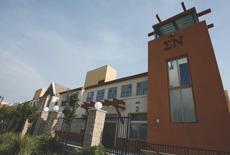 David J. Olender / Assistant Photo Editor
David J. Olender / Assistant Photo EditorAs you read this sentence you might be walking to or from class for the first time this year, or you could be sitting at home, skipping your first class of the year. But no matter what, many of us have one goal in mind: to succeed.
There’s a dream in everyone’s head, be it making important decisions from the deck of a yacht or from the seat of your private jet. But as you will read, many business students will tell you that achieving that dream is not so much about what you know, but who you know.
“Networking seems to be the only way to really get anywhere these days,” said Seth Au, recent San Diego State business graduate and Sigma Nu alumnus.
Au recently started his very own consulting company in San Diego and is quickly realizing that a bulging Rolodex can only help come crunch time.
“You’ll never know whom you’ll be working with or where you’ll be in the future, so networking seems to be a great tool,” Au said.
For many students, the hardest part of networking is to meet others within their own specific field, but for students here on campus, fraternities and sororities are a great way to meet people and begin building that web of contacts for later in life.
Jared Smits, another recent graduate who just landed a job as an assistant to the head of real estate for Walt Disney Co., feels his Greek life prepared him for his business life.
“I always knew that fraternities could help with the networking aspect when I needed it,” Smits said. “Every interview I’ve ever had has at some point steered to talking about fraternity life. A good portion of people in business have a Greek background and love to talk about the good old days, so it instantly gives you something in common with co-workers and your superiors.”
SDSU boasts some of most famous business people in the industry today including: Eric Fremont, senior vice president of Verizon Communications; Jack Goodall, former CEO of Jack in the Box; Sol Price, founder of Price Club; Ralph Rubio, founder of Rubio’s; and Jim Sinegal, CEO of Costco. Many of these business people and more are alumni of some of the Greek organizations here on campus.
“Going Greek can definitely help developing social skills,” Au said. “In order to have a successful business, you must be good at interacting with people to market your business. Unless you plan on being a person that sits behind a desk his whole career, social skills are very important to help someone to move up in the business world.”
For some members of Greek organizations on campus, running the day-to-day aspects of a fraternity or sorority is very much like running a small business. Each house on campus has a budget, must make decisions to better the house within that budget and keep members (like employees) happy.
“Fraternities are really microcosms of a real business, so the tools you gather in a frat will carry on to future endeavors in a real business environment,” said political science senior and member of Sigma Nu fraternity Collin Lee.
So by this time you’re either sitting in your first class listening to your first lecture, or you’re at home realizing that the semester is already in full swing.
If you’re still not sold on the power of networking, remember this: 85 percent of all Fortune 500 executives were Greek. Of the nation’s 50 largest corporations, 43 are headed by Greeks and over 85 percent of the student leaders on 730 campuses are members of Greek-letter organizations.
“After a year of running my own business through an internship and going into my third year in a fraternity, I would recommend going Greek for any aspiring business man or woman,” business junior Marc Schroeder said.
Regardless of your decision to go Greek or not this year, hopefully by the end of the day you realize the real idea is to find what you like and find the people who can help you the most. The people you know can get you into the door, and your passion for that job is what keeps you in it.






